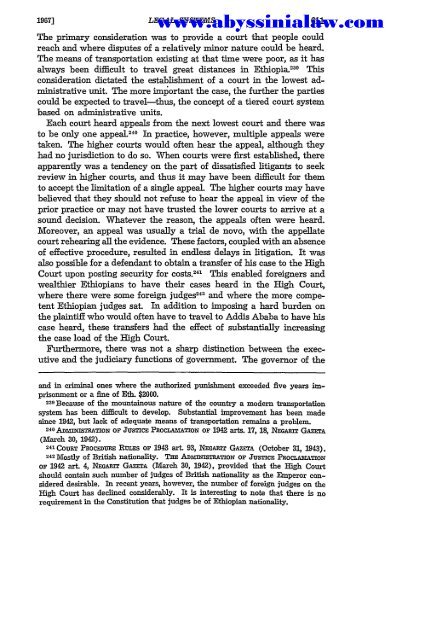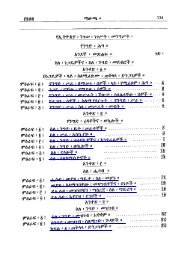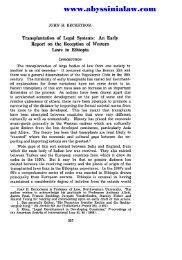You also want an ePaper? Increase the reach of your titles
YUMPU automatically turns print PDFs into web optimized ePapers that Google loves.
LEGAL SYSTEMS<br />
The primary consideration was to provide a court that people could<br />
reach and where disputes of a relatively minor nature could be heard.<br />
The means of transportation existing at that time were poor, as it has<br />
always been difficult to travel great distances in Ethiopia. 239 This<br />
consideration dictated the establishment of a court in the lowest administrative<br />
unit. The more important the case, the further the parties<br />
could be expected to travel-thus, the concept of a tiered court system<br />
based on administrative units.<br />
Each court heard appeals from the next lowest court and there was<br />
to be only one appeal. 240 In practice, however, multiple appeals were<br />
taken. The higher courts would often hear the appeal, although they<br />
had no jurisdiction to do so. When courts were first established, there<br />
apparently was a tendency on the part of dissatisfied litigants to seek<br />
review in higher courts, and thus it may have been difficult for them<br />
to accept the limitation of a single appeal. The higher courts may have<br />
believed that they should not refuse to hear the appeal in view of the<br />
prior practice or may not have trusted the lower courts to arrive at a<br />
sound decision. Whatever the reason, the appeals often were heard.<br />
Moreover, an appeal was usually a trial de novo, with the appellate<br />
court rehearing all the evidence. These factors, coupled with an absence<br />
of effective procedure, resulted in endless delays in litigation. It was<br />
also possible for a defendant to obtain a transfer of his case to the High<br />
Court upon posting security for costs. 241 1967] www.abyssinialaw.com<br />
This enabled foreigners and<br />
wealthier Ethiopians to have their cases heard in the High Court,<br />
where there were some foreign judges242 and where the more competent<br />
Ethiopian judges sat. In addition to imposing a hard burden on<br />
the plaintiff who would often have to travel to Addis Ababa to have his<br />
case heard, these transfers had the effect of substantially increasing<br />
the case load of the High Court.<br />
Furthermore, there was not a sharp distinction between the executive<br />
and the judiciary functions of government. The governor of the<br />
and in criminal ones where the authorized punishment exceeded five years imprisonment<br />
or a fine of Eth. $2000.<br />
239<br />
Because of the mountainous nature of the country a modern transportation<br />
system has been difficult to develop. Substantial improvement has been made<br />
since 1942, but lack of adequate means of transportation remains a problem.<br />
2 4<br />
ADmINISTRATION OF JUSTICE PRocL i TION OF 1942 arts. 17, 18, NEGARI GAzERTA<br />
(March 30, 1942).<br />
241 COURT PROCEDURE RULEs OF 1943 art. 93, NEGARI GAzr_- (October 31, 1943).<br />
242 Mostly of British nationality. THE AmnNmmTRATioN OF JUSTICE PocrAMTION<br />
OF 1942 art. 4, NEGARIT GAZETA (March 30, 1942), provided that the High Court<br />
should contain such number of judges of British nationality as the Emperor considered<br />
desirable. In recent years, however, the number of foreign judges on the<br />
High Court has declined considerably. It is interesting to note that there is no<br />
requirement in the Constitution that judges be of Ethiopian nationality.





